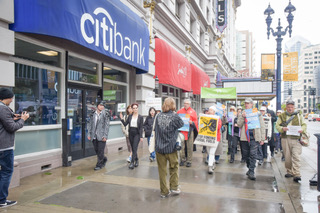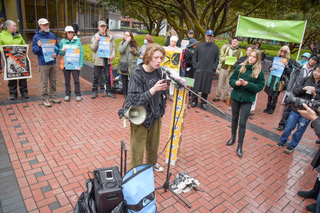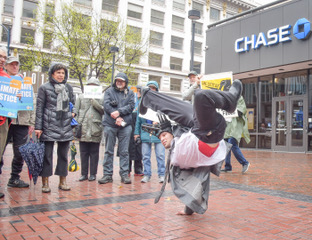By Diane Lopez Hughes
Over 50 San Diego climate activists rallied at Chase Bank Plaza at 101 West Broadway and marched to Citibank today as part of a national day of action across the US to pressure the major banks to stop financing the expansion of the fossil fuel industry. Organizers included Third Act SoCal, Sierra Club, SanDiego350, SanDiego350 Youth, Climate Action Campaign, ACT, Hammond Climate Solutions, Surfrider, and the Interfaith Coalition for Earth Justice.

The rally was among the more than 100 events that took place in over half the United States involving rallies, art installations with activists cutting up their credit cards in protest at the billions of dollars in lending and underwriting banks provide to fossil fuels companies and projects. These projects are responsible for harmful emissions that scientists have linked to extreme weather events – emphasized this week by a recent Intergovernmental Panel on Climate Change report AR6 Climate Change 2022: Impacts, Adaptation and Vulnerability — IPCC – which have caused death and destruction in the US and across the world.
“The folks most affected by climate change are youth and people of color,” declared speaker Clovis Honore, Interfaith Coalition for Earth Justice member. “We’ve go to tell these banks: ‘This is my money! I am taking my power back and giving it to a bank that respects, honors, and loves this planet and its future as much as I do!’”
The San Diego protest was held in the midst of weeks of unusual weather which many say is related to the climate crisis. Mudslides and severe storms resulting in loss of life, injury, displacement, destruction of homes, and enormous property damage are consequences of the damaging effects of a warming planet years in advance from original predictions.
Major rallies took place in New York City, Washington D.C., and San Francisco with hundreds of people attending many of these events.
The day was organized by Third Act, a group for climate activists over 60 years co-founded by veteran campaigner Bill McKibben. In total, more than 50 partner organizations have signed on to support the day of action including the Sierra Club, GreenFaith, the Hip Hop Caucus, Union of Concerned Scientists and People’s Action around the country.

SanDiego350 Youth organizer Theo Martien told the mostly older crowd of 50 people, “You are here because you know your generation messed up. And you didn’t know what we know now. Today’s youth now DO know, and want to do something about it. NOW!….” and encouraged youth to “start off in the right place by taking the SD350 Third Act Youth Pledge and refusing to sign up with big banks that are already killing our more vulnerable neighbors.”
The top four fossil fuel financing banks are JP Morgan Chase, Citi, Bank of America and Wells Fargo, pumping over one quarter of the $4.6 trillion total financing for fossil fuels by the top 60 global banks between 2016 and 2021.
While the US banks have verbally committed to help reach the global target of Net Zero emissions by 2050, none have published a credible transition plan or ruled out fossil fuel financing for expanding projects.
By contrast some European banks are making these commitments, leaving US banks lagging in the drive to cut global emissions and address climate change. In December HSBC, Europe’s largest bank, announced it would no longer finance new oil and gas projects. Danske Bank this year said it would stop financing oil and gas projects and corporate financing.
US-headquartered banks have financed controversial projects in the US. This includes funding harmful methane gas companies and projects along the Texas and Louisiana Gulf Coast which disproportionately impacted communities of color.
Climate Action Campaign research and policy analyst Brenda Garcia Millan offered, “ “The use of fossil fuels results in significant climate, environmental, and health costs that are not reflected in market prices. These costs are known as externalities which include multiple health issues, such as asthma, cancer, heart disease, and premature death. Globally, fossil fuel pollution is responsible for one in five deaths. If we want this climate and public crisis to stop, we need to call out the institutions providing the bulk of new oil and gas financing.”

The banks are also funding climate destruction globally. Citi is the second largest methane gas financier in the world, it is the biggest funder of fossil fuel expansion in Africa, the largest backer of state-run projects in the Amazon and was found to have been involved in a deal in Peru which allegedly involved oil spills and links to terrorist groups.
Thousands and thousands of customers have pledged to move their money out of these banks if the banks won’t move their investments out of fossil fuels, and these pledges were delivered to the banks. People do not want their money, savings, and credit cards to be used by these banks to finance climate destruction.
In light of the recent upheavals in the banking sector and the greater concentration of deposits in the large Wall Street banks, more than ever we need to demand that these banks use their power and funds responsibly. The banks must manage both financial risks and climate risks; indeed climate risks are financial risks. We need safe and secure banking on a safe planet.
